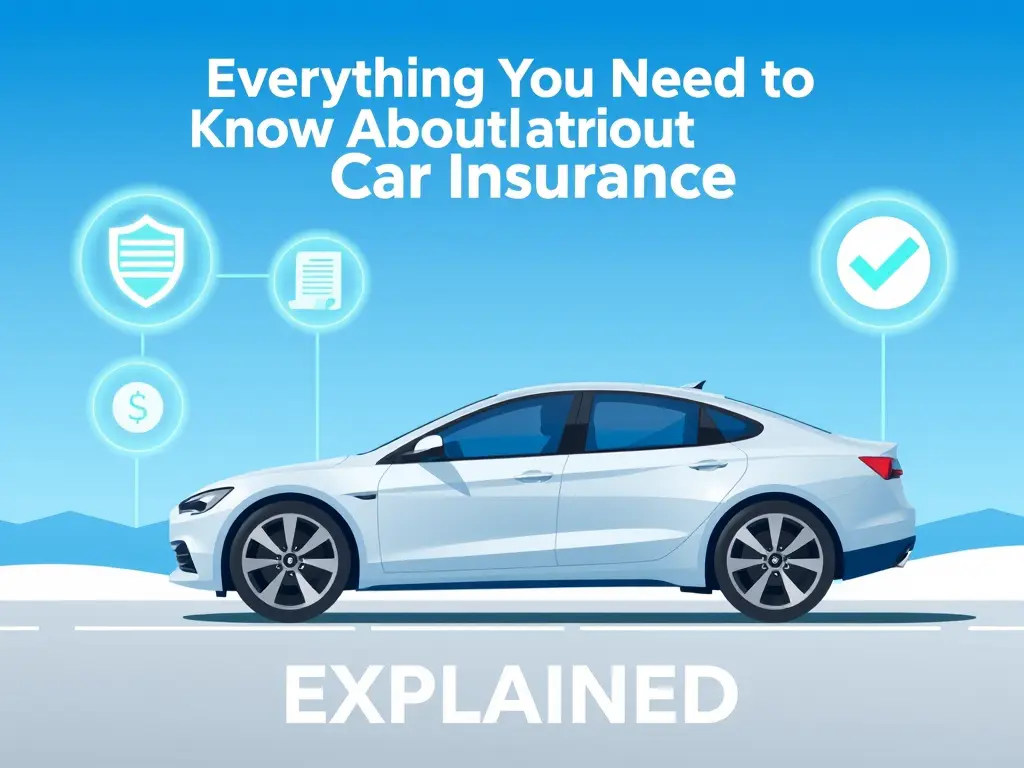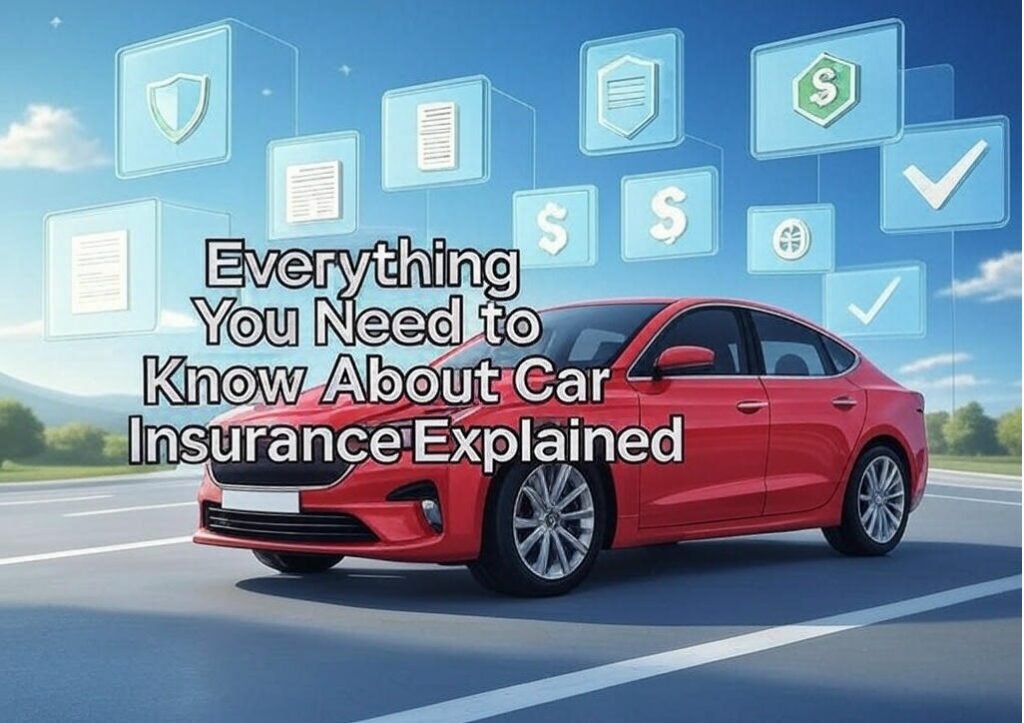Whether you’re buying your first car, switching providers, or just curious, understanding car insurance is a big deal. While it might not be the most exciting subject, it’s super important like an umbrella on a rainy day, you may not think about it until you really need it. This guide breaks car insurance down in simple terms, so you’re not left scratching your head when it comes time to choose the best policy.
What Is Car Insurance and Why Do You Need It?
Let’s start with the basics. Car insurance is a contract between you and an insurance company. You pay them a premium, and in return, they help cover the costs if something happens to your vehicle like an accident, theft, or damage.
Imagine you get into a car accident. Without insurance, you’d be stuck paying for the repairs, medical bills, and possibly legal costs out of your own pocket. Car insurance offers financial protection when the unexpected happens, and in most places, it’s the law.
Is Car Insurance Required?
In nearly every U.S. state, some form of car insurance is legally required. The only exception is New Hampshire, where you don’t have to buy insurance but you still have to prove you can pay if you’re at fault in an accident.
Each state has its own rules for how much coverage you need. But even if you only get the legal minimum, that might not be enough to protect you in a serious situation.
Types of Car Insurance Coverage
Let’s break down the main types of car insurance coverage. These are the building blocks of your policy:
- Liability Coverage: Covers damages to others if you’re at fault. This includes two things:
- Bodily injury liability: Covers medical expenses for the other party.
- Property damage liability: Pays for repairs to the other person’s vehicle or property.
- Collision Coverage: Pays for repairs to your own car if it’s damaged in a crash, no matter who’s at fault.
- Comprehensive Coverage: Covers non-accident-related damages like theft, fire, falling trees, or even hitting a deer.
- Personal Injury Protection (PIP): Helps pay for medical bills for you and your passengers, regardless of who caused the accident (required in some states).
- Uninsured/Underinsured Motorist Coverage: Protects you if someone hits you but doesn’t have enough or any insurance.
Optional Add-Ons
On top of these basics, you can add extra coverage for more peace of mind:
- Roadside assistance: For breakdowns, dead batteries, flat tires, or when you lock your keys in the car.
- Rental car reimbursement: Covers the cost of a rental while your car is in the shop.
- Gap insurance: If you owe more on your car loan than your car is worth, this covers the difference if your car is totaled.
How Much Does Car Insurance Cost?
This is one of the most common questions and the answer depends on several things.
- Location: People in urban areas usually pay more because of higher accident and theft rates.
- Age and driving experience: Younger drivers usually have higher premiums due to their lack of experience.
- Driving record: Accidents or tickets on your record? Expect to pay more.
- Vehicle type: Sports cars cost more than sedans. Newer, expensive cars cost more to insure.
- Credit score: In most states, insurers consider your credit when pricing your policy. A higher score usually means lower premiums.
So, how much will you pay? On average, Americans spend around $1,500 per year on car insurance, but it can vary a lot. The best way to find out is to get quotes from multiple companies and don’t be afraid to shop around.
Tips for Saving Money on Car Insurance

Car insurance can be expensive, but there are ways to lower your premium. Here are some smart strategies:
- Bundle policies: Combine your auto insurance with homeowners or renters insurance from the same company.
- Increase your deductible: A higher deductible means a lower monthly premium but make sure you can afford it if you have to file a claim.
- Ask for discounts: Many companies give discounts for good driving, low mileage, having certain safety features, or being a student with good grades.
- Maintain a clean driving record: Fewer accidents and violations mean more savings.
- Take a defensive driving course: Some insurers offer discounts if you complete an approved safety program.
How to Choose the Right Car Insurance Policy
Every driver is different, which means every insurance policy should be, too. Here’s how to find the coverage that works best for you:

1. Understand Your Needs
Think about your situation. Do you drive frequently, own a new or leased car, or live in a high-theft area? Tailor your coverage to match your real-life needs.
2. Compare Providers
Don’t just settle for the first quote. Compare rates from at least three different insurers and read customer reviews. Cheap doesn’t always mean good look for companies with solid reputations for handling claims.
3. Look at the Details
Read the fine print. What’s actually covered and what isn’t? Are there coverage limits? Are there situations where you’re not protected? These details matter.
What Happens When You File a Claim?
If you ever need to use your insurance after an accident or theft, here’s a quick look at what happens:
- Call your insurer as soon as it’s safe to do so.
- Provide as much information as possible, including photos, names of people involved, and a police report (if applicable).
- An adjuster will be assigned to investigate and estimate damage costs.
- If approved, you’ll receive payment or repairs will be arranged.
It’s a good idea to keep a copy of your insurance card in your glove compartment and save your provider’s number in your phone just in case!
How Often Should You Review Your Car Insurance?
Think of your car insurance like your budget it’s not a “set it and forget it” deal.
You should review your policy at least once a year, or anytime your life changes significantly like moving, getting married, buying a new car, or adding a new driver to your policy. A quick review could reveal opportunities to save or upgrade your protection.
FAQ’s what is Car Insurance?
Here are some questions and their short answers we found asked by our readers frequently.
Disclaimer: We are not a financial adviser; please consult one.
Yes, car insurance is worth having as it protects against financial losses from accidents, theft, or damage, and is legally required in most states.
Without it, you risk hefty fines, legal issues, and paying out-of-pocket for repairs or medical bills.
Car insurance is based on factors like age, driving record, vehicle type, location, credit score, coverage level, and annual mileage.
Insurers also consider discounts, claims history, and local risks like accident rates or theft
Save on car insurance by comparing quotes, using discounts like good student or safe driver, and bundling policies.
Choose a safe, low-cost car, maintain a clean driving record, and consider higher deductibles to lower premiums.
The average cost of car insurance per month in 2025 is about $175 for full coverage and $69 for minimum coverage, varying by state, age, and driving record.
Factors like location, vehicle type, and credit score can significantly impact individual rates.
Travelers is the best car insurance company overall in 2025, offering affordable rates, extensive coverage options, and top customer satisfaction.
USAA is also excellent but limited to military members and their families.
Final Thoughts: Is Car Insurance Worth It?
If you’re wondering whether car insurance is worth the money, the simple answer is yes.

Car accidents can cost thousands even tens of thousands of dollars. Even a minor fender bender can lead to repairs, medical bills, and legal expenses. Car insurance gives you peace of mind, knowing you’re covered if things go wrong.
Sure, the monthly premium might seem like just another bill. But when you need it most, you’ll be glad it’s there.
Ready to Hit the Road?
Getting the right car insurance is just as important as choosing the right car. It protects you, your passengers, your wallet and even those you share the road with. Spend the time to learn your options, compare different providers, and tailor your coverage to fit your lifestyle.
Because when it comes down to it, being protected is one of the smartest driving decisions you’ll ever make.
Looking for More Insurance Insights?
Want to learn more about car insurance basics? Check out our other helpful guides on:
- Cheapest Car Insurance Options in Oklahoma for 2025
- 2025 Kentucky Car Insurance Rates: Requirements & Costs Explained
- Austin Car Insurance Rates in 2025: What Drivers Should Know
- Cheapest Car Insurance in Ohio for 2025 Revealed
- Las Vegas Car Insurance Rates and Saving Tips for 2025
- Georgia Car Insurance Rates, Requirements, and Money-Saving Tips
- Best Cheap Car Insurance Options for Young Adults in 2025
- How to Get Cheap Car Insurance for New Drivers
- Cheapest Car Insurance Options in Maryland for 2025
- Top Auto Loan Rates and Tips to Save on Financing
Have questions or want to share your own insurance story? Drop a comment below we’d love to hear from you!

